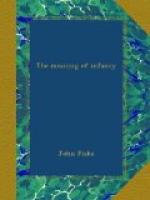As soon as this statement was made by Wallace, it seemed to me to open up an entirely new world of speculation. There was this enormous antiquity of man, during the greater part of which he did not know enough to make history. We see man existing here on the earth, no one can say how long, but surely many hundreds of thousands of years, yet only during just the last little fringe of four or five thousand years has he arrived at the point where he makes history. Before that, something was going on, a great many things were going on, while his ancestors were slowly growing up to that point of intelligence where it began to make itself felt in the recording of events. This agrees with Wallace’s suggestion of a long period of psychical change, accompanied by slight physical change.
Well, in the spring of 1871, when Darwin’s “Descent of Man” came out, just about the same time I happened to be reading Wallace’s account of his experiences in the Malay Archipelago, and how at one time he caught a female orang-outang with a new-born baby, and the mother died, and Wallace brought up the baby orang-outang by hand; and this baby orang-outang had a kind of infancy which was a great deal longer than that of a cow or a sheep, but it was nothing compared to human infancy in length. This little orang-outang could not get up and march around, as mammals of less intelligence do, when he was first born, or within three or four days; but after three or four weeks or so he would get up, and begin taking hold of something and pushing it around, just as children push a chair; and he went through a period of staring at his hands, as human babies do, and altogether was a good deal slower in getting to the point where he could take care of himself. And while I was reading of that I thought, Dear me! if there is any one thing in which the human race is signally distinguished from other mammals, it is in the enormous duration of their infancy; but it is a point that I do not recollect ever seeing any naturalist so much as allude to.
It happened at just that time that I was making researches in psychology about the organization of experiences, the way in which conscious intelligent action can pass down into quasi-automatic action, the generation of instincts, and various allied questions; and I thought, Can it be that the increase of intelligence in an animal, if carried beyond a certain point, must necessarily result in prolongation of the period of infancy,—must necessarily result in the birth of the mammal at a less developed stage, leaving something to be done, leaving a good deal to be done, after birth? And then the argument seemed to come along very naturally, that for every action of life, every adjustment which a creature makes in life, whether a muscular adjustment or an intelligent adjustment, there has got to be some registration effected in the nervous system, some line of transit worn for nervous force to follow; there has got to be a connection




